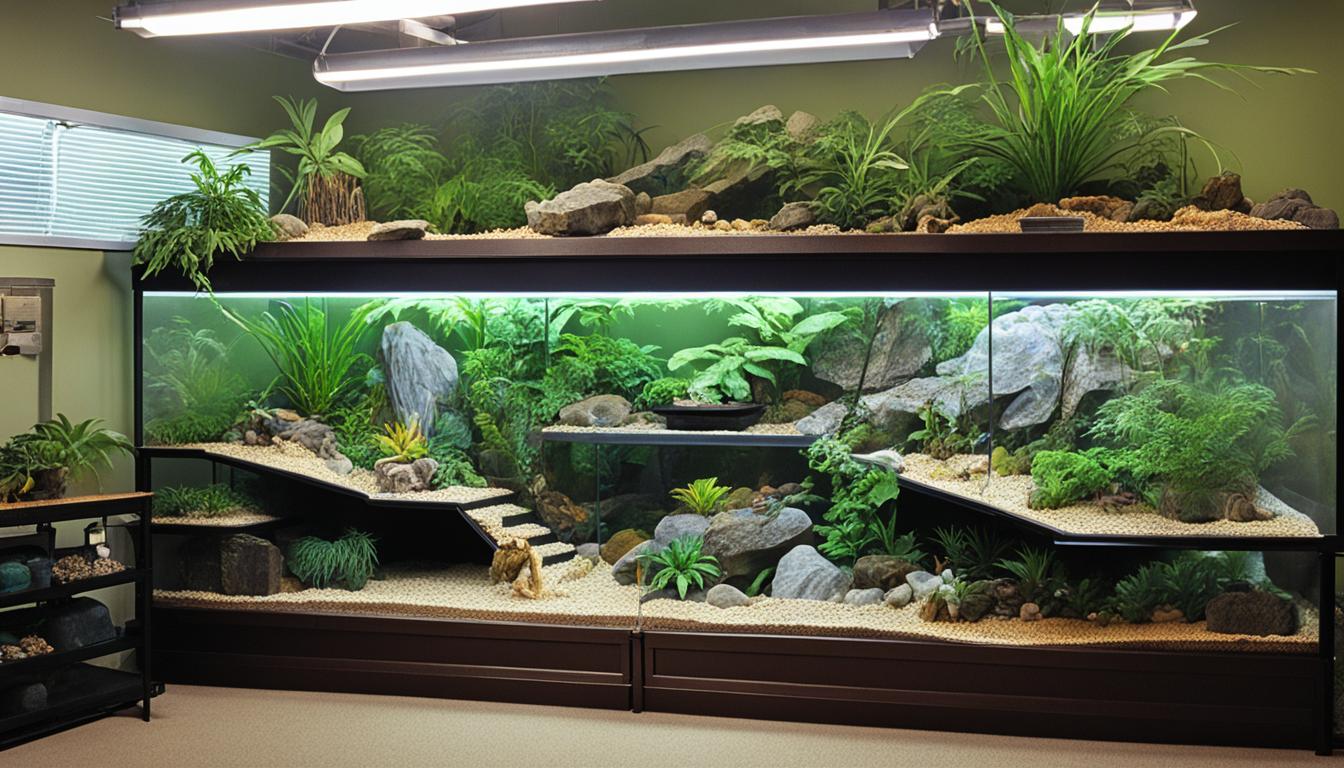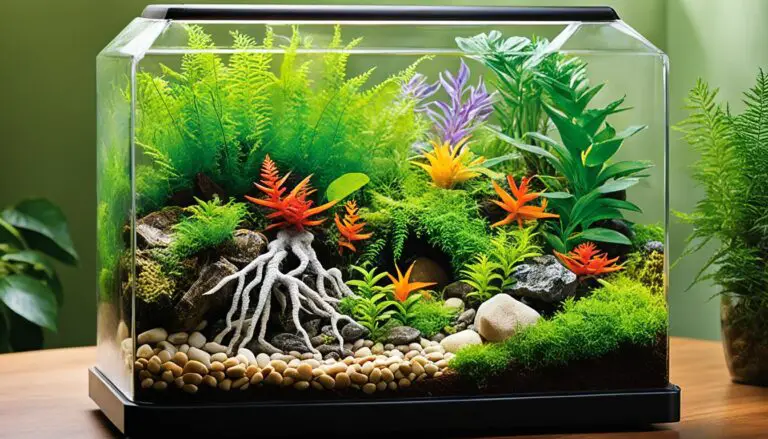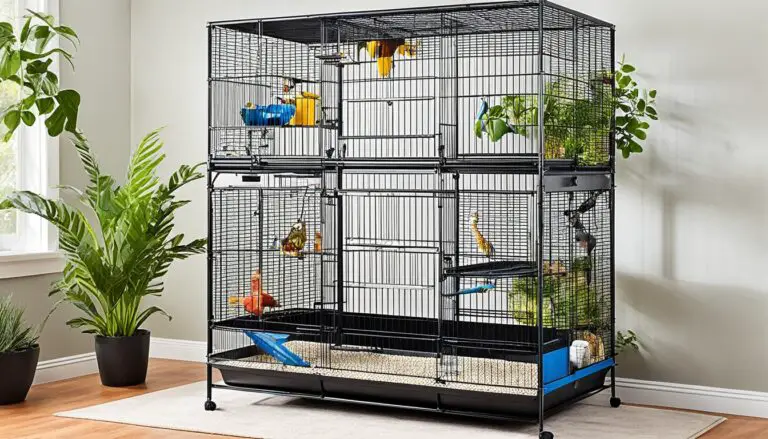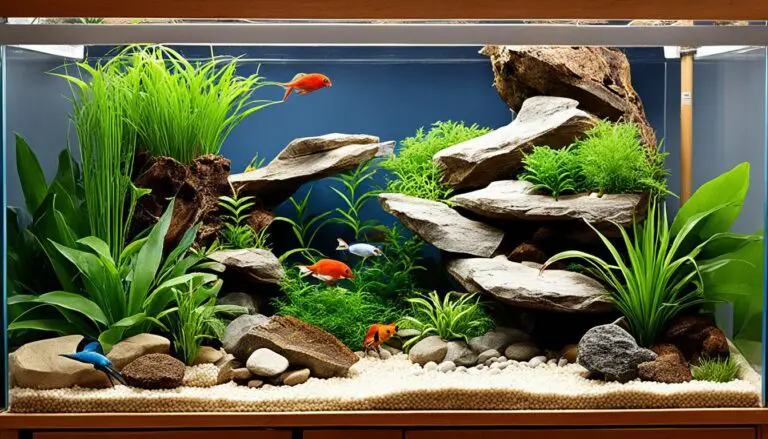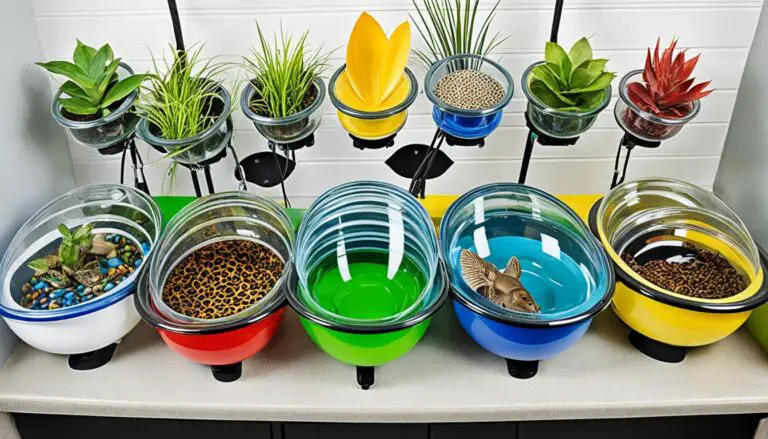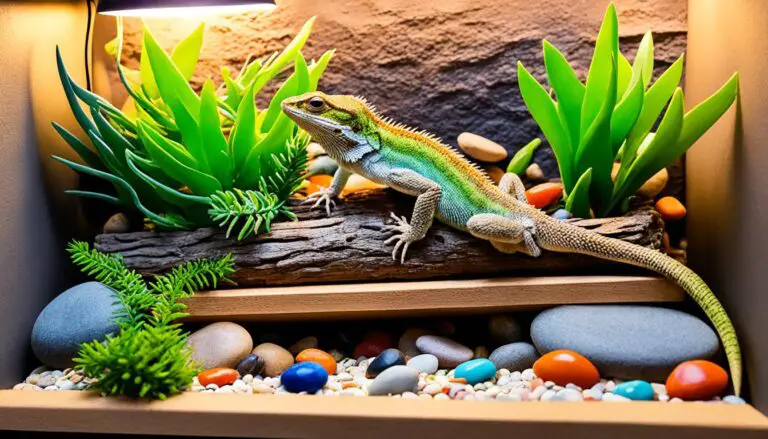Exotic Pet Housing Maintenance Tips & Tricks
Owning an exotic pet comes with the responsibility of providing specialized care and meeting their unique needs. This includes maintaining their housing to ensure a healthy living space for these extraordinary creatures. In this article, we will discuss the best practices for **exotic pet housing maintenance**, providing you with valuable tips and tricks for keeping their enclosures clean and conducive to their well-being.
Key Takeaways:
- Regularly clean and disinfect the exotic pet habitat to prevent bacterial growth and ensure a healthy living environment.
- Monitor and control temperature, humidity, and lighting in the enclosure to mimic the pet’s natural habitat.
- Use appropriate substrates and provide ample space for your exotic pet to engage in their natural behaviors.
- Research and provide a species-appropriate diet to meet your exotic pet’s dietary needs.
- Schedule regular veterinary check-ups to maintain your exotic pet’s health and receive professional guidance.
Getting to Know Your Exotic Pet
Before bringing home an exotic pet, it is crucial to invest time and effort into getting to know them on a deeper level. Understanding their species-specific needs, natural behavior, lifespan, potential health risks, and how to adapt your lifestyle to their needs is essential for their well-being and your successful ownership.
Each exotic pet has its own unique set of requirements. Conduct meticulous research to gather information about their specific needs, such as the ideal temperature and humidity levels for their habitat, appropriate diet and feeding schedule, necessary space for exercise and enrichment, and socialization requirements.
“The more you know about your exotic pet, the better equipped you’ll be to provide them with a happy and healthy life.”
Take into account their natural behavior and instincts. For instance, if you’re considering a reptile, be aware of their need for basking spots, hiding places, and appropriate substrates. If you’re interested in keeping a bird, understand their need for mental stimulation, social interaction, and flight space.
Knowing the expected lifespan of your exotic pet is vital for long-term planning and commitment. Some species have longer lifespans than others, and it’s essential to be prepared for the responsibilities that come with providing care throughout their entire lives.
Identifying potential health risks and understanding common health issues related to your exotic pet’s species is crucial. Consult with a veterinarian specializing in exotic pets to gain insights into preventive measures, identifying signs of illness, and providing prompt treatment.
Adapting your lifestyle to meet your exotic pet’s needs is an important step in responsible ownership. This may include adjusting your daily routine, making modifications to your home or living space, and allocating time and resources for their care and enrichment.
To provide your exotic pet with the best possible care, it’s essential to continuously educate yourself, seek professional advice, and stay up to date with the latest research and recommendations pertaining to their species.
Understanding Exotic Pet Behavior
Observing and interpreting your exotic pet’s behavior can provide valuable insights into their physical and emotional well-being. Pay attention to subtle cues and body language, as it can help you understand their mood, stress levels, and overall happiness.
“By understanding your exotic pet’s behavior, you can meet their needs more effectively and ensure a harmonious bond between you and your pet.”
Remember that each exotic pet species has its own unique behaviors and communication methods. Educate yourself on these specific behaviors to better understand and interact with your pet.
Providing a safe, stimulating, and enriching environment that allows your exotic pet to engage in their natural behaviors is crucial for their mental and physical well-being. This can include providing appropriate toys, environmental enrichment, and opportunities for social interaction.
Understanding your exotic pet’s behavior is essential for their well-being.
Housing Your Exotic Pet: More than Just a Cage
When it comes to housing exotic pets, providing a specialized environment goes beyond simply placing them in a basic cage or enclosure. These unique creatures require a living space that closely mimics their natural habitat, taking into account factors such as temperature and humidity control, light exposure, substrate type, and the ability to engage in natural behaviors. By creating a specialized environment, you can prevent stress, promote good health, and ensure your exotic pet’s overall well-being.
One crucial aspect of exotic pet housing is temperature and humidity control. Different species have specific temperature and humidity requirements that must be met to maintain their optimal health. It is essential to invest in temperature-regulating devices such as heat lamps, thermostats, and humidifiers to create the ideal living conditions for your pet.
Proper light exposure is also vital for exotic pets. Many species have specific lighting needs, such as UVB lighting, which helps them synthesize vitamin D, crucial for their bone health. Providing the appropriate lighting not only supports their physical well-being but also encourages natural behaviors and a sense of normalcy.
Choosing the right substrate is another critical factor in exotic pet housing. Substrate refers to the material that lines the bottom of the enclosure and can vary depending on the species. From sands and mulch to reptile carpet and paper bedding, selecting the appropriate substrate ensures comfort for your pet and helps prevent stress and potential health issues.
Preventing Stress and Health Problems
Creating a specialized environment for your exotic pet is essential in preventing stress and health problems. Exotic animals have specific natural behaviors, and providing them with enough space to engage in these behaviors is crucial. Whether it’s climbing, burrowing, or swimming, your pet should have enough room to express these behaviors comfortably.
Exotic pets need to feel secure and have their environmental needs met to thrive.
Stress can lead to a variety of health issues in exotic pets, including suppressed immune systems, poor appetite, and behavioral problems. By ensuring their housing meets their natural behaviors and environmental needs, you can help minimize stress and promote a healthier, happier life for your pet.
Ultimately, the goal of housing your exotic pet is to provide a specialized environment that caters to their unique needs. This includes temperature and humidity control, proper light exposure, suitable substrate, and ample space for natural behaviors. By investing in their housing, you not only prevent stress and health problems but also allow your exotic pet to live a fulfilling life in captivity.
Creating a specialized environment for your exotic pet is a crucial aspect of responsible ownership.

| Housing Requirements | Description |
|---|---|
| Temperature and Humidity Control | Invest in devices like heat lamps and humidifiers to maintain optimal living conditions. |
| Light Exposure | Provide appropriate lighting, such as UVB, to meet your pet’s lighting needs and encourage natural behaviors. |
| Substrate Type | Select suitable substrates that ensure comfort for your pet and prevent stress and health issues. |
| Space for Natural Behaviors | Offer enough room for your exotic pet to engage in their natural behaviors comfortably. |
Essential Dietary Needs of Exotic Pets
Exotic pets require unique and specialized diets that differ from traditional pets. It is essential to provide a species-appropriate diet to ensure their overall health and well-being. Understanding the dietary needs of your exotic pet and providing the right nutrition is crucial for their happiness and longevity.
Species-Specific Diets
Each species of exotic pet has its own specific dietary requirements. For example, an iguana requires a diet rich in fresh vegetables and fruits, while a parrot needs a combination of seeds and insects. On the other hand, a ferret thrives on a strict carnivorous diet. It is important to research and understand the dietary needs of your specific exotic pet to ensure they receive the nutrition they require.
Providing Guidance for Dietary Needs
Seeking guidance from exotic pet experts or veterinarians experienced in exotic pet care is crucial when it comes to ensuring proper nutrition. They can provide valuable insights into the specific dietary needs of your pet and offer advice on feeding schedules, portion sizes, and the appropriate balance of nutrients. By consulting with professionals, you can ensure that your exotic pet receives the dietary guidance they need for optimal health.
Fresh Veggies and Fruits
Fresh vegetables and fruits should play a significant role in the diet of many exotic pets. These provide essential vitamins, minerals, and fiber necessary for their well-being. Incorporating a variety of colorful veggies and fruits into their diet can help support their immune system, digestive health, and overall vitality. Make sure to research which vegetables and fruits are suitable for your particular exotic pet as some may be harmful if consumed.
Seeds and Insects
Seeds and insects are essential sources of nutrition for certain types of exotic pets, such as birds and reptiles. These food items provide protein, healthy fats, and other essential nutrients that promote good health and energy. However, it is important to ensure that the seeds and insects are appropriate for your pet’s species and sourced from trusted suppliers to avoid any potential health risks.
Maintaining a Balanced Diet
Just like humans, exotic pets require a well-balanced diet to thrive. It is essential to provide a variety of food items that meet their specific nutritional needs. A balanced diet should consist of the appropriate ratio of proteins, carbohydrates, fats, vitamins, and minerals. Regularly consult with your veterinarian or exotic pet nutritionist to ensure that your pet’s diet is tailored to their specific needs and adjusted as they grow and develop.
Dietary Considerations for Health Conditions
Some exotic pets may have specific health conditions that require dietary modifications. For example, pets with certain metabolic disorders or allergies may need specialized diets to manage their condition. If your exotic pet has any underlying health issues, it is important to work closely with a veterinarian to develop a dietary plan that supports their specific needs and promotes their overall well-being.
The Value of Regular Vet Check-ups for Exotic Pets
Regular veterinary check-ups are crucial for maintaining the health and well-being of your exotic pet. These check-ups provide more than just routine examinations; they play a vital role in preventative health care, early detection of potential issues, and ensuring your pet’s overall health.
During regular vet check-ups, your veterinarian will:
- Evaluate your pet’s general health and check for any signs of illness or abnormalities.
- Discuss specific dietary and housing concerns to ensure your pet’s nutritional needs are met and their environment is suitable.
- Administer necessary vaccinations to protect your exotic pet from harmful diseases.
- Provide parasite treatments, such as deworming medication or topical preventatives, to safeguard against ticks, fleas, or other parasites.
Regular check-ups also give you the opportunity to seek professional advice and ask any questions or concerns you may have regarding your exotic pet’s care. Veterinarians experienced in exotic pet care can provide tailored guidance, ensuring you have the information needed to ensure your pet’s health and happiness.
Benefits of Regular Vet Check-ups:
- Preventative Health Care: Regular check-ups allow your vet to identify potential health issues before they become more serious problems. This proactive approach can save your pet from suffering and prevent costly treatments.
- Early Detection of Health Issues: By conducting regular examinations, veterinarians can catch any underlying health issues in their early stages when they are more treatable. This can be crucial for the long-term health and well-being of your exotic pet.
- Ensuring Preventative Treatments: Vaccinations and parasite treatments are essential for protecting your pet from diseases and parasites. Regular vet check-ups ensure that these preventative measures are up to date, providing your pet with the necessary protection.
- Professional Advice: Having a veterinarian dedicated to exotic pet care allows you to receive professional guidance on diet, housing, and overall care specific to your pet’s species. This expert advice can help you make informed decisions to ensure your pet’s health and happiness.

| Benefits of Regular Vet Check-ups: | Details |
|---|---|
| Preventative Health Care | Regular check-ups allow for early detection and prevention of potential health issues. |
| Early Detection of Health Issues | Veterinarians can catch underlying health issues early, increasing treatment success rates. |
| Ensuring Preventative Treatments | Regular check-ups ensure that vaccinations and parasite treatments are up to date. |
| Professional Advice | Veterinarians experienced in exotic pet care can provide tailored guidance and support. |
Maintaining Hygiene for Exotic Pets
Cleanliness is essential in preventing illnesses in exotic pets. By maintaining proper hygiene, you can ensure the health and well-being of your unique companion. Here are some key tips for keeping your exotic pet’s habitat clean.
Regular Cleaning
Regular cleaning of your exotic pet’s habitat is crucial to prevent the buildup of dirt, bacteria, and other contaminants. Create a cleaning routine and stick to it to maintain a clean and healthy living space for your pet.
- Clean the enclosure thoroughly at least once a week. Remove all bedding, furnishings, and toys.
- Wash the enclosure with a pet-safe disinfectant, ensuring you follow the directions on the product label.
- Allow the enclosure to dry completely before adding fresh bedding and returning your pet’s belongings.
- Dispose of soiled bedding promptly to reduce the risk of bacterial growth and unpleasant odors.
Toy and Dish Cleaning
Toys and dishes in your exotic pet’s habitat can accumulate bacteria and should be cleaned regularly. Here’s how to keep them clean:
- Remove toys and dishes from the enclosure.
- Wash them with warm, soapy water, ensuring you scrub them thoroughly.
- Rinse them well to remove any soap residue.
- Dry them completely before placing them back in the enclosure.
Preventing Bacterial Growth
Bacterial growth can lead to infections and other health issues in exotic pets. Take these preventive measures to minimize the risk:
Ensure your exotic pet’s habitat is properly ventilated to reduce moisture and humidity levels, which can contribute to bacterial growth.
Preventing Illnesses
Avoiding illnesses is essential for maintaining the health of your exotic pet. Proper hygiene practices can help prevent the spread of diseases. Here are some additional tips:
- Wash your hands thoroughly before and after handling your exotic pet.
- Do not allow your pet to come into contact with potentially harmful substances or toxic plants.
- If you notice any signs of illness in your pet, such as changes in behavior, appetite, or appearance, consult a veterinarian specializing in exotic pet care.
Conclusion
Providing proper care and maintenance for your exotic pet is crucial for their happiness and health. Responsible ownership entails meeting their unique needs through specialized care, regular veterinary check-ups, proper housing, a species-appropriate diet, and maintaining hygiene.
By following these tips and providing the best care possible, you can ensure a happy and healthy life for your exotic pet. Be diligent in understanding and meeting their specific requirements, and always consult professionals experienced in exotic pet care for guidance.
Remember, exotic pets require specialized care and attention. Your commitment to responsible ownership will contribute to their overall well-being and quality of life. By prioritizing their happiness and health, you can forge a strong bond with your unique pet and create a nurturing environment where they can thrive.
FAQ
What are some important tips for maintaining exotic pet housing?
How can I adapt my lifestyle to meet the needs of my exotic pet?
What should I consider when housing my exotic pet?
What kind of diet do exotic pets need?
How important are regular veterinary check-ups for exotic pets?
How can I maintain hygiene for my exotic pet?
Source Links
- https://animalfamilyveterinarycare.com/blog/exotic-pet-care-davenport/
- https://bevsvt.com/introducing-exotic-pets-to-children/
- https://walesanimalclinic.com/exotic-pet-care-101/
Peter Stones is the founder of Exotic Pets Place, the leading online resource for exotic pet care information.
With over 10 years of hands-on exotic pet ownership experience, he is deeply passionate about sharing his expertise to help others properly care for their unusual pets.
When he's not writing extensively researched articles or connecting with fellow exotic pet enthusiasts worldwide, you can find Peter at home tending to his own beloved menagerie of exotic animals.

